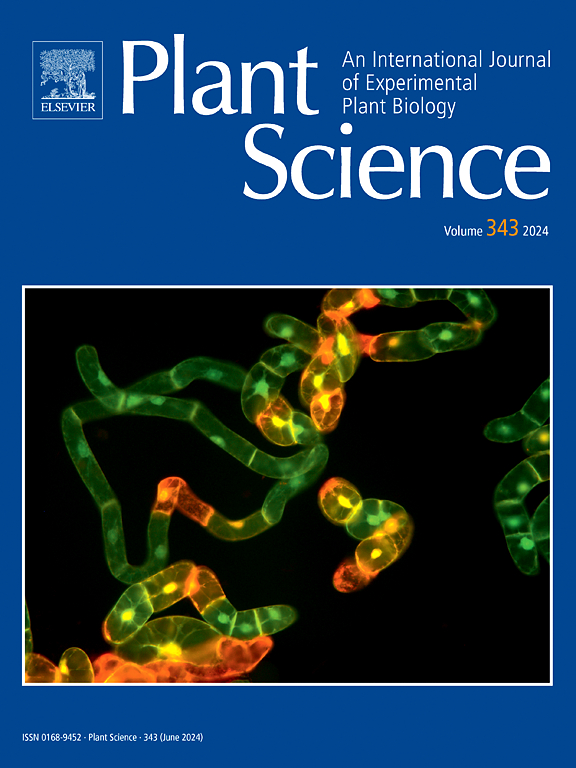拟南芥盐胁迫启动过程中胁迫记忆的表观遗传学和转录组学特征。
IF 4.1
2区 生物学
Q2 BIOCHEMISTRY & MOLECULAR BIOLOGY
引用次数: 0
摘要
植物可以发展出一种“压力记忆”,使它们在再次暴露于压力下时能够更有效地做出反应。据报道,启动在应激记忆的形成中起着重要作用。在本研究中,拟南芥植株用50mM NaCl处理24h。经过一段恢复期后,他们受到后续的盐胁迫,观察到与未启动组相比,启动组受到的影响明显较小。此外,在启动和盐胁迫应用后,通过RNA测序和ChIP分析,研究了影响胁迫反应的表观遗传记忆相关基因。这些分析确定了α -亚麻酸代谢、二萜生物发生和植物激素信号转导途径是与胁迫记忆相关的最显著改变的途径。此外,对这些通路中的关键基因进行了ChIP-qPCR分析。RNA-seq分析与H3K27me3和H3K4me组蛋白标记的变化相关,特别是在OPR3、AOC1和LOX3基因中,使我们能够获得关于它们对植物胁迫记忆影响的有力证据。这些发现有望指导未来的研究,以操纵已确定的参与表观遗传应激记忆的候选基因,从而有助于更深入地了解这些过程背后的分子机制。本文章由计算机程序翻译,如有差异,请以英文原文为准。
Epigenetic and transcriptomic features of stress memory during salt-stress priming in arabidopsis
Plants can develop a ‘stress memory’ that enables them to respond more effectively upon re-exposure to stress. It has been reported that priming plays a role in the formation of stress memory. In this study, Arabidopsis plants were primed with 50 mM NaCl for 24 h. Following a recovery period, they were subjected to subsequent salt stress, and it was observed that the primed plants were significantly less affected compared to the non-primed group. Furthermore, genes associated with epigenetic memory influencing stress response were investigated through RNA sequencing and ChIP analyses following the priming and salt stress applications. These analyses identified alpha-linolenic acid metabolism, diterpenoid biogenesis, and plant hormone signal transduction pathways as the most significantly altered pathways related with stress memory. Additionally, ChIP-qPCR analyses were performed on key genes within these pathways. RNA-seq analysis and changes in H3K27me3 and H3K4me histone marks were correlated, specifically in OPR3, AOC1, and LOX3 genes that enabled us to obtain strong evidence regarding their effects on plant stress memory. The findings are expected to guide future studies in manipulating the identified candidate genes involved in epigenetic stress memory, thereby contributing to a deeper understanding of the molecular mechanisms underlying these processes.
求助全文
通过发布文献求助,成功后即可免费获取论文全文。
去求助
来源期刊

Plant Science
生物-生化与分子生物学
CiteScore
9.10
自引率
1.90%
发文量
322
审稿时长
33 days
期刊介绍:
Plant Science will publish in the minimum of time, research manuscripts as well as commissioned reviews and commentaries recommended by its referees in all areas of experimental plant biology with emphasis in the broad areas of genomics, proteomics, biochemistry (including enzymology), physiology, cell biology, development, genetics, functional plant breeding, systems biology and the interaction of plants with the environment.
Manuscripts for full consideration should be written concisely and essentially as a final report. The main criterion for publication is that the manuscript must contain original and significant insights that lead to a better understanding of fundamental plant biology. Papers centering on plant cell culture should be of interest to a wide audience and methods employed result in a substantial improvement over existing established techniques and approaches. Methods papers are welcome only when the technique(s) described is novel or provides a major advancement of established protocols.
 求助内容:
求助内容: 应助结果提醒方式:
应助结果提醒方式:


